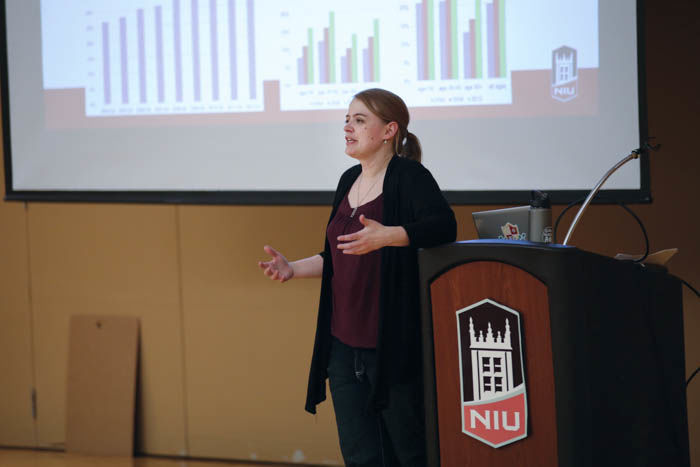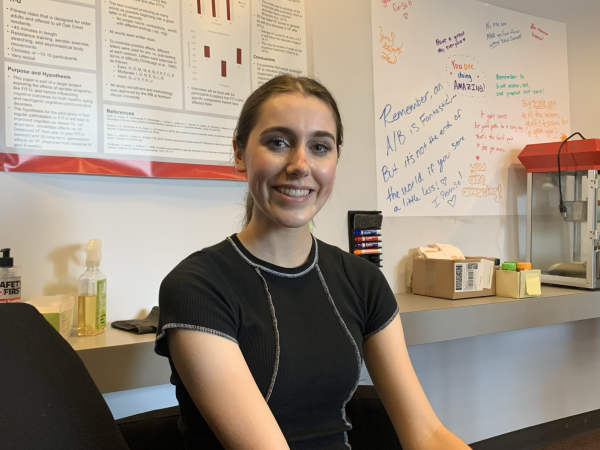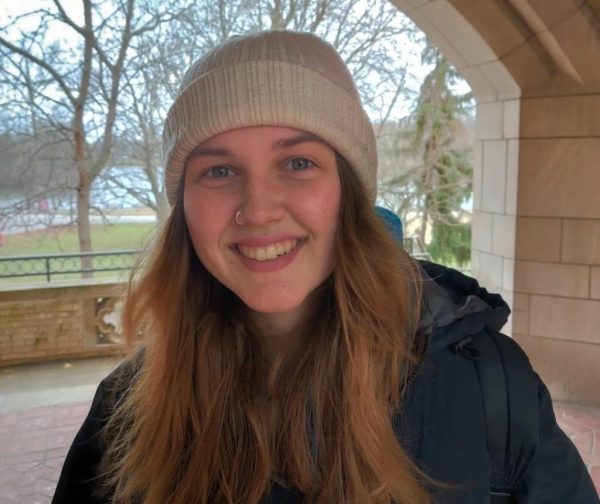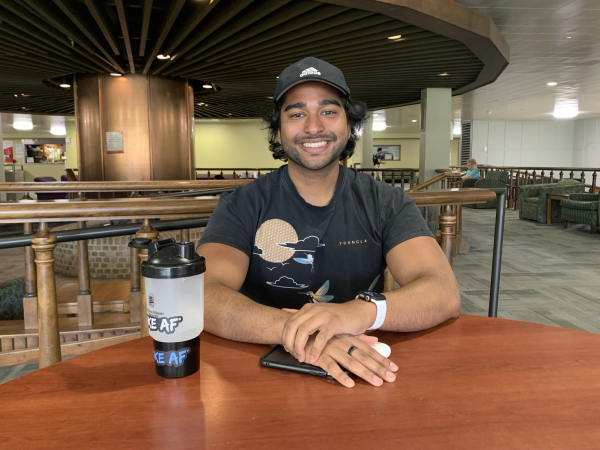Students get tips, advice about finances
Senior sociology major Candy Rosales opens the Financial Literacy event with remarks of its importance to students and introduction of a few speakers. The location for the evening is inside the Holmes Student Center Regency Room on Thursday night.
April 9, 2018
A student-led organization held its first annual seminar Thursday emphasizing the importance of financial literacy.
The seminar was hosted by the Adela de la Torre Latino Honor Society, a student group that recognizes and promotes greatness among LatinX students through scholarships, lead
DeKALB — Adela de la Torre Latino Honor Society held its first annual seminar Thursday emphasizing the importance of financial literacy.
The seminar was hosted by the Adela de la Torre Latino Honor Society, a student group that recognizes and promotes greatness among LatinX students through scholarships, leadership and service. The seminar was about gaining financial freedom and the importance of money management to help students in the future.
Candy Rosales, vice president of Adela de la Torre Latino Honor Society, said she introduced the idea of hosting a financial literacy event for students and developed the event with the help of members from the organization’s executive general board.
Rosales said the average American lacks basic financial education.
“I want students to get out there and start educating themselves more on how to work their money, whether it is now or when they are getting ready to graduate,” Rosales said.
There were two speakers and two panelists who presented at the event.
The keynote speaker was Gina Nicolosi, the finance department chair in the College of Business. Nicolosi talked about subtopics regarding career salaries, student loans and credit cards.
She said millennials will work five jobs before ultimately settling down into a career.
“With the pullback of support from state and government for higher education, more of the burden is being transferred on the undergraduate students, which is causing them to fall in a larger portion of debt,” Nicolosi said.
Claudia Ornelas, senior pre-physical therapy major, said she gained a better understanding on how to start improving money management.
The closing speaker was Russell Page, a College of Business instructor. Page offered tricks to students on how to save money for a potential early retirement.
“Pay yourself first,” Page said.
He said students should put 10 percent of each current paycheck into a 401K, money market or stocks. He said forget about the money saved and let it compound until it is absolutely required.
He also advised students adjust the percentage going into savings accordingly whenever salary increases.
“Managing money is definitely my priority after college to make sure my debts getting paid off, making sure I have enough money for grad school,” Ornelas said.
Nicolosi said if an individual files bankruptcy, student loans are exempt.
“Be careful with student loan[s] that you actually need, so do you really need a loan to pay for your Molly’s bill?” Nicolosi said.
Education is beneficial for the long-term because statistics show the benefits of having a college degree is increasing over the years, Nicolosi said.
“There is a difference between wants and needs,” Rosales said.
She said it’s important to practice being rational with money and not to spend it based on whether or not it’s been a good or bad day. Being around people who support a healthy spending lifestyle is essential, Rosales said.
“I think it all comes down to knowing how to work your money to be a little bit more comfortable with how you live,” Rosales said.
ership and service, The seminar was about gaining financial freedom and the importance of money management to help students in the future.
Candy Rosales, vice president of Adela de la Torre Latino Honor Society, said she introduced the idea of hosting a financial literacy event for students and developed the event with the help of members from the organization’s executive general board.
Rosales said the average American lacks basic financial education.
“I want students to get out there and start educating themselves more on how to work their money, whether it is now or when they are getting ready to graduate,” Rosales said.
There were two speakers and two panelists who presented at the event.
The keynote speaker was Gina Nicolosi, the finance department chair in the College of Business. Nicolosi talked about subtopics regarding career salaries, student loans and credit cards.
She said millennials will work five jobs before ultimately settling down into a career.
“With the pull back of support from state and government for higher education, more of the burden is being transferred on the undergraduate students, which is causing them to fall in a larger portion of debt,” Nicolosi said.
Claudia Ornelas, senior pre-physical therapy major, said she gained a better understanding on how to start improving money management.
The closing speaker was Russell Page, a College of Business instructor. Page offered tricks to students on how to save money for a potential early retirement.
“Pay yourself first,” Page said.
He said students should put 10 percent of each current paycheck into a 401K, money market or stocks. He said forget about the money saved and let it compound until it is absolutely required.
He also advised students adjust the percentage going into savings accordingly whenever their salary increases.
“Managing money is definitely my priority after college to make sure my debts getting paid off, making sure I have enough money for grad school,” Ornelas said.
Nicolosi said if an individual files bankruptcy, student loans are exempt.
“Be careful with student loan[s] that you actually need, so do you really need a loan to pay for your Molly’s bill?” Nicolosi said.
Education is beneficial for the long-term because statistics show the benefits of having a college degree is increasing over the years, Nicolosi said.
“There is a difference between wants and needs,” Rosales said.
She said it’s important to practice being rational with money and not to spend it based on whether or not it’s been a good or bad day. Being around people who support a healthy spending lifestyle is essential, Rosales said.
“I think it all comes down to knowing how to work your money to be a little bit more comfortable with how you live,” Rosales said.














